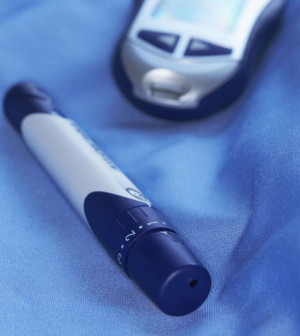- Recognizing the Signs of Hypothyroidism
- 10 Strategies to Overcome Insomnia
- Could Artificial Sweeteners Be Aging the Brain Faster?
- Techniques for Soothing Your Nervous System
- Does the Water in Your House Smell Funny? Here’s Why
- Can a Daily Dose of Apple Cider Vinegar Actually Aid Weight Loss?
- 6 Health Beverages That Can Actually Spike Your Blood Sugar
- Treatment Options for Social Anxiety Disorder
- Understanding the Connection Between Anxiety and Depression
- How Daily Prunes Can Influence Cholesterol and Inflammation
New Study Paints Grim Health Picture for Obese Teens


Severely obese teens are at increased risk for a host of serious health problems as adults, including asthma, kidney disease and sleep disorders, according to a new study.
“Most people understand that the longer you carry extra weight, the higher your chances of developing heart disease or diabetes,” said study author Dr. Thomas Inge, professor of surgery and pediatrics at Cincinnati Children’s Hospital Medical Center, in Ohio. “But now it seems that an even larger number of conditions should be added to the list of health problems that some obese teenagers will likely face down the road.”
The study, published online Nov. 18 in the journal Pediatrics, included more than 1,500 severely obese American adults, aged 19 to 76. All were about to undergo weight-loss surgery. They were asked about their weight at age 18 and then assessed for medical problems related to obesity.
Forty-two percent of the participants were normal weight at age 18, the researchers found. But 29 percent were obese at 18, including 13 percent who were severely obese. Ninety-six percent of the participants had at least one obesity-related health condition.
Severe obesity was defined as a body-mass index (BMI) of 35 or greater — 220 pounds or more for an average-height woman. BMI is a calculation of body fat based on height and weight.
The researchers found that participants who were severely obese as teens had a greatly increased risk of serious health problems compared to those who were normal weight as teens.
They were four times more likely to have swollen legs with skin ulcers; more than three times more likely to have severe walking limitations and abnormal kidney function; and much more likely to have asthma, diabetes, obstructive sleep apnea and polycystic ovary syndrome, a condition that can cause cysts on a woman’s ovaries.
“As the number of children with severe obesity continues to increase, it is important for pediatricians to inform families about the short- and long-term health issues linked to this weight gain,” Inge said in a medical center news release.
More information
The U.S. National Institute of Diabetes and Digestive and Kidney Diseases explains the health risks of being overweight.
Source: HealthDay
Copyright © 2026 HealthDay. All rights reserved.










